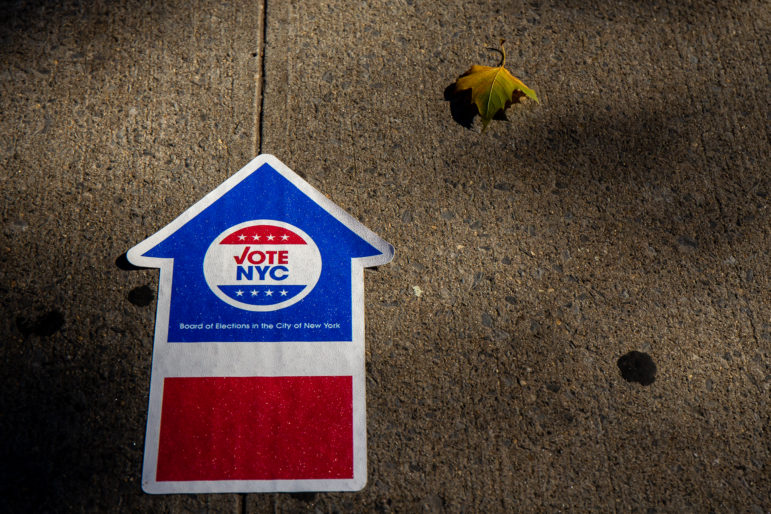“The district attorney decides who to charge with crimes, what crimes to charge, what length of sentence to seek, and what, if any, alternatives to incarceration they will offer. Despite their influence and the ever-expanding role ‘public safety’ occupies in the public discourse, these incumbents rarely face a serious challenger on Election Day.”

Adi Talwar
A marker directs voters to their poll site on Election Day.This year, the Bronx, Queens, and Staten Island will each elect a new district attorney—a position that wields significant influence over the criminal legal system.
With large budgets and limited oversight, the district attorney can, and often does, exercise their power to impact vulnerable New Yorkers in devastating ways. The district attorney decides who to charge with crimes, what crimes to charge, what length of sentence to seek, and what, if any, alternatives to incarceration they will offer. Despite their influence and the ever-expanding role “public safety” occupies in the public discourse, these incumbents rarely face a serious challenger on Election Day.
In Staten Island, Mike McMahon ran unopposed for his third term as district attorney. In Queens and the Bronx, incumbents Melinda Katz and Darcel Clark both won their primary election in June with more than 70 percent of the vote. While Katz has two challengers on Tuesday’s general election ballot, she’s heavily favored to win.
A key issue implicating all three candidates: the 29 deaths at the Rikers Island jail complex since 2022. DA Clark of the Bronx refused to prosecute corrections officers in the majority of instances, according to a 2019 Nunez Independent Monitor Report, and violence upon incarcerated individuals continues to rise. Meanwhile, the union representing those officers, the Correction Officers Benevolent Association, was the largest single contributor of campaign donations in her 2015 and 2019 elections.
In Queens, the appellate courts have found that several prosecutors engaged in misconduct by discriminating on the basis of race or religion for prospective jurors, but these attorneys remained employed under DA Katz and even received raises or were elevated to senior positions within her administration. These issues went largely undiscussed as each incumbent, selected and protected by their county’s party, will effortlessly secure another four-year term.
A lack of options on the ballot stifles voter participation and is especially frustrating to communities that are directly impacted by the decision-making of the district attorney. New Yorkers detained at Rikers Island because they cannot afford the monetary bail requested by these offices must jump through extraordinary hoops just to access the vote. They are justifiably outraged when they open the ballot to find their choice has been made for them.
Criminal justice reform has been under attack since 2020 with persistent efforts to undermine data-backed policies that bring New York into alignment with other states throughout the country. District attorneys, including DA Clark, have been among those pushing to roll back reforms.
Yet, in 2021, Manhattan voters elected Alvin Bragg as district attorney—the only Black candidate in a field of eight Democrats—who ran on a reform platform, had experienced police violence on multiple occasions while growing up in Harlem, and received many progressive endorsements. Upon taking office and implementing said platform, the police union, right-wing and moderate media, and a conservative super PAC attacked Manhattan voters’ choice for district attorney. They went so far as to call on the governor to remove District Attorney Bragg from office.
DA Bragg’s platform mirrored prosecutorial policies implemented throughout the country and even in neighboring borough Brooklyn. They address some of the known policy failures and racial disparities that characterize the criminal legal system. These reforms were baselessly described by Bragg’s critics as a threat to police officer safety and predicted to cause crime rates to rise. A study conducted in 2022 by the Center for American Progress, however, found that homicide rates actually increased less rapidly in places that had elected progressive prosecutors than in those with more traditional and carceral district attorneys.
Given the powerful role special interests play in influencing electoral politics, Bragg subsequently walked back many of his policies and abandoned the voters who endorsed his platform when electing him. Unlike special interest groups, voters have limited recourse to hold him accountable unless he is challenged in the next election.
New Yorkers deserve prosecutors who reflect their values and are accountable to the people, especially to the communities which have been directly impacted by over-policing and mass incarceration. Many prosecutors, including Katz and Clark, have adopted the language of a “progressive prosecutor,” but fail to live up to those commitments while in office.
During her 2019 campaign against public defender Tiffany Cabán, DA Katz promised to end the prosecution of sex work in the borough. However, data from 2022 revealed that Katz prosecuted the majority of arrests for prostitution and that Queens has the highest numbers of arrests out of any borough for this charge, making her the most regressive district attorney in New York City on this issue.
When a competitive race occurs, incumbent prosecutors are forced to face the communities they often ignore. District attorneys must also seek endorsements from community leaders, advocates, and organizations by answering questionnaires, attending interviews, debates, and town halls. These opportunities for accountability and assessment are especially vital because they can influence policy platforms and decision-making for district attorneys while in office. Without this, prosecutors will remain beholden to the special interests and media outlets that make the most noise.
Any elected official, group, or community leader who claims the progressive label should welcome challengers to incumbents. The long-standing tradition of protecting incumbent candidates without re-assessment leads to a lack of voter engagement and disillusionment with the democratic process. Cohesive support for competitive races may or may not result in new district attorneys but will elevate the issues most important to impacted communities and ensure that sitting elected officials are responsive and accountable to their constituents.
Claire Stottlemyer is a member of the People’s Coalition for District Attorney Accountability and a public defender in New York City.








